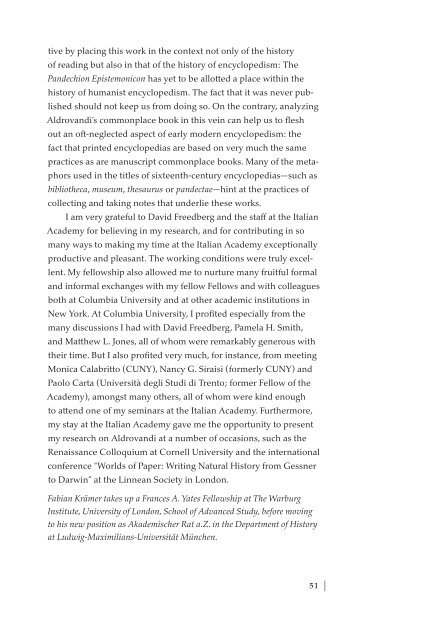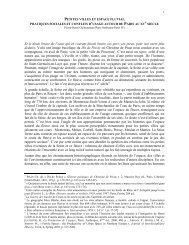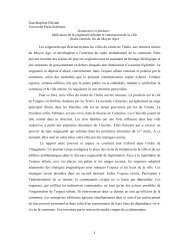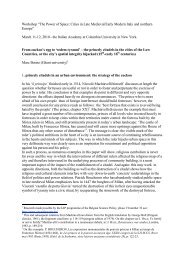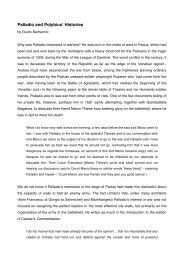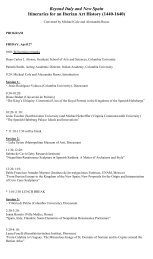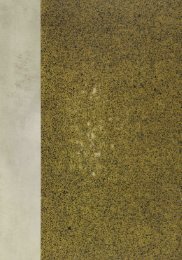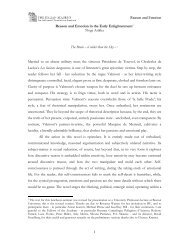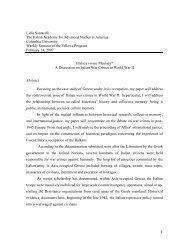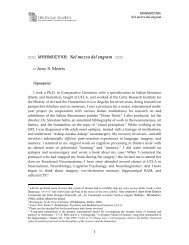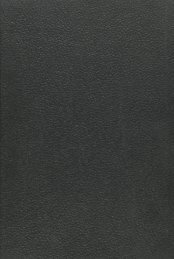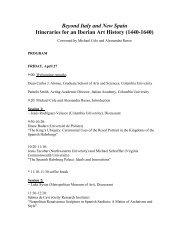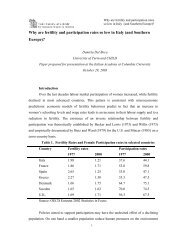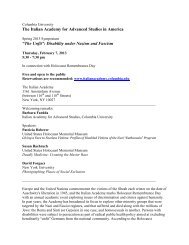2011-2012 - The Italian Academy - Columbia University
2011-2012 - The Italian Academy - Columbia University
2011-2012 - The Italian Academy - Columbia University
You also want an ePaper? Increase the reach of your titles
YUMPU automatically turns print PDFs into web optimized ePapers that Google loves.
tive by placing this work in the context not only of the history<br />
of reading but also in that of the history of encyclopedism: <strong>The</strong><br />
Pandechion Epistemonicon has yet to be allotted a place within the<br />
history of humanist encyclopedism. <strong>The</strong> fact that it was never published<br />
should not keep us from doing so. On the contrary, analyzing<br />
Aldrovandi’s commonplace book in this vein can help us to flesh<br />
out an oft-neglected aspect of early modern encyclopedism: the<br />
fact that printed encyclopedias are based on very much the same<br />
practices as are manuscript commonplace books. Many of the metaphors<br />
used in the titles of sixteenth-century encyclopedias—such as<br />
bibliotheca, museum, thesaurus or pandectae—hint at the practices of<br />
collecting and taking notes that underlie these works.<br />
I am very grateful to David Freedberg and the staff at the <strong>Italian</strong><br />
<strong>Academy</strong> for believing in my research, and for contributing in so<br />
many ways to making my time at the <strong>Italian</strong> <strong>Academy</strong> exceptionally<br />
productive and pleasant. <strong>The</strong> working conditions were truly excellent.<br />
My fellowship also allowed me to nurture many fruitful formal<br />
and informal exchanges with my fellow Fellows and with colleagues<br />
both at <strong>Columbia</strong> <strong>University</strong> and at other academic institutions in<br />
New York. At <strong>Columbia</strong> <strong>University</strong>, I profited especially from the<br />
many discussions I had with David Freedberg, Pamela H. Smith,<br />
and Matthew L. Jones, all of whom were remarkably generous with<br />
their time. But I also profited very much, for instance, from meeting<br />
Monica Calabritto (CUNY), Nancy G. Siraisi (formerly CUNY) and<br />
Paolo Carta (Università degli Studi di Trento; former Fellow of the<br />
<strong>Academy</strong>), amongst many others, all of whom were kind enough<br />
to attend one of my seminars at the <strong>Italian</strong> <strong>Academy</strong>. Furthermore,<br />
my stay at the <strong>Italian</strong> <strong>Academy</strong> gave me the opportunity to present<br />
my research on Aldrovandi at a number of occasions, such as the<br />
Renaissance Colloquium at Cornell <strong>University</strong> and the international<br />
conference “Worlds of Paper: Writing Natural History from Gessner<br />
to Darwin” at the Linnean Society in London.<br />
Fabian Krämer takes up a Frances A. Yates Fellowship at <strong>The</strong> Warburg<br />
Institute, <strong>University</strong> of London, School of Advanced Study, before moving<br />
to his new position as Akademischer Rat a.Z. in the Department of History<br />
at Ludwig-Maximilians-Universität München.<br />
51 |


